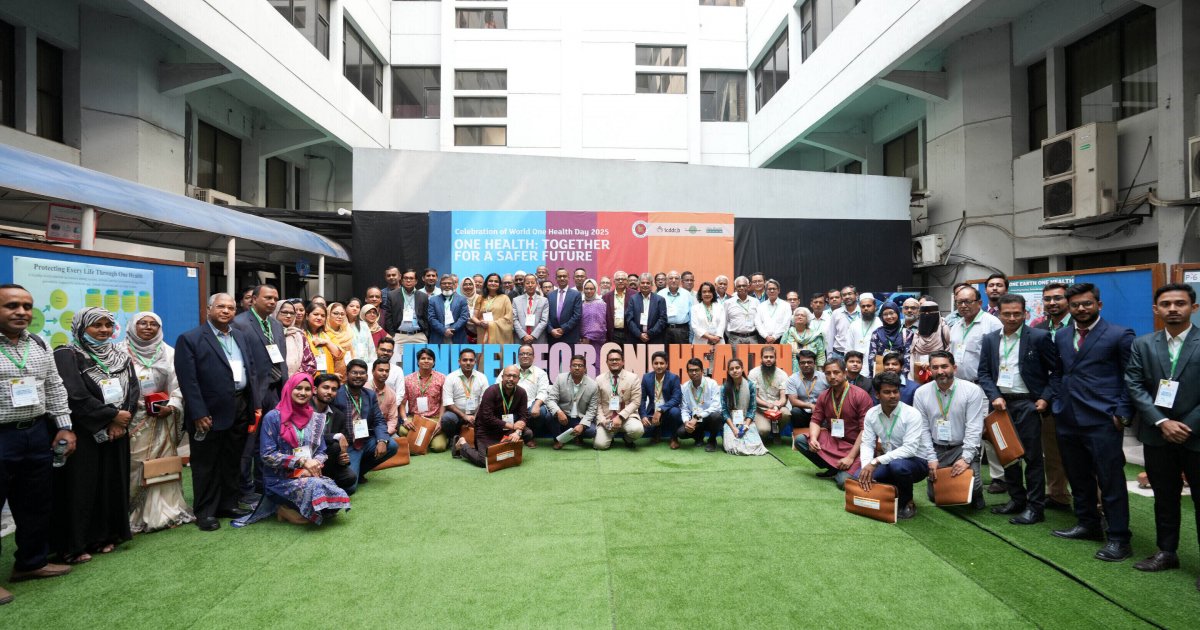Bangladesh on Tuesday joined countries around the world in celebrating World One Health Day 2025, reaffirming its commitment to building a safer and more sustainable future through the One Health approach — a collaborative, science-based framework that recognizes the interconnection between human, animal, and environmental health.
The event, hosted by icddr,b in collaboration with the government of Bangladesh, One Health Secretariat and One Health Bangladesh, was held at icddr,b’s Sasakawa Auditorium, drawing around 200 participants, including representatives from UN agencies, government bodies, academia, and international and national organizations, said a press release issued on Tuesday.
The theme of this year’s celebration, “One Health: Together for a Safer World”, reflects the growing urgency of working across disciplines to protect human, animal and environmental health as one interconnected system.
The event featured a keynote presentation on the One Health approach, a poster exhibition and prize distribution and a lively panel discussion on “One Health in Action”, highlighting how Bangladesh’s cross-sector collaboration is addressing challenges from disease surveillance to environmental conservation.
Dr Tahmeed Ahmed, executive director at icddr,b, welcomed all to the inaugural session of the event and said: “The issue of One Health today is not just important for Bangladesh but also for many low- and middle-income as well as developed countries. I am sure today’s event will help us reflect on the challenges we face and identify simple, actionable steps we can take for the country’s future.”
Md Amir Hosain Chowdhury, chief conservator of forest at the Forest Department, and Dr Md Abu Sufian, director general at the Department of Livestock Services, graced the event as guests of honour. The session was chaired by Dr Tahmina Shirin, director of IEDCR, and moderated by Dr Sukanta Chowdhury, scientist at icddr,b.
Delivering the keynote address, Prof Dr Nitish Chandra Debnath, national coordinator of One Health Bangladesh, traced how the One Health movement evolved from early public health pioneers to a global framework shaping pandemic preparedness and sustainable development.
“icddr,b is where our journey began, along with other partners. I am grateful they have hosted this year’s celebration, and I hope our partnership continues to flourish,” he said.
He noted that threats such as zoonotic diseases, antimicrobial resistance, and climate change can no longer be managed in isolation.
In his remarks, Md Amir Hosain Chowdhury said: “We are losing our biodiversity and our environmental balance. We all must come forward, raise awareness at the root level, and take targeted actions to protect environmental and animal health; otherwise, we will face serious consequences in the future.”
Dr Md Abu Sufian, director general of the Department of Livestock Services, said: “We need stronger collaboration at the ministerial level and a focal point to move our One Health goals forward.”
Dr Tahmina Shirin said: “Today we reaffirm our commitment to build a healthier, safer Bangladesh through the One Health approach. Thanks to icddr,b, a national focal institute in disease surveillance and outbreak investigation, for advocating the One Health initiative in the country in partnership with all relevant stakeholders.
The expert panel discussed actionable strategies to mitigate zoonotic risks, particularly the re-emergence of H5N1 Avian Influenza in humans and its expanding host range across poultry and cats.
Topics included worker protection, vaccination strategies, antimicrobial resistance, and the role of animal welfare in disease prevention amid global funding constraints.
Among the 10 posters presented by students from various universities, the top three teams were awarded first, second, and third prizes based on participants’ choice.
Observed globally on November 3, World One Health Day calls attention to the deep interconnection between human, animal and ecosystem health. By breaking barriers between disciplines, the One Health approach offers a shared path to prevent future pandemics, ensure food safety, combat antimicrobial resistance, and safeguard biodiversity for generations to come.



